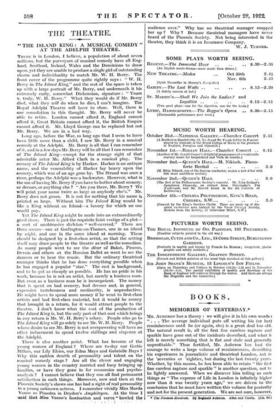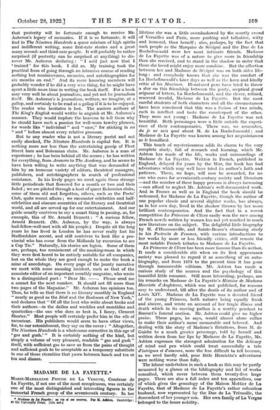BOOKS.
MEMORIES OF YESTERDAY.* M.R. AUBERON has a theory : we will give it in his own words The average individual puts off writing his (or her) reminiscences until he (or again, she) is a great deal too old. The natural result is, all the first fine careless rapture and sparkle have gone out of the incidents described, and what is left is merely something that is flat and stale and generally unprofitable." Thus fortified, Mr. Auberon has had the courage to write a large volume of reminiscences, describing his experiences in journalistic and theatrical London, not in the 'seventies or 'eighties, but during the last twenty years. Whether, by this means, he has been able to retain " the first fine careless rapture and sparkle " is another question, not to be lightly answered. When we discover him telling us such things as " The expense of Life in London is infinitely higher now than it was twenty years ago," we are driven to the conclusion that he must have written this volume for posterity and not for the present generation. We are not sure, however, * The Nineteen Hundreds. By Regisald Antenna. Allan and Unwin. [12a. dd-1 that posterity will be fortunate enough to receive Mr. Auberon's legacy of memories. If it is so fortunate, it will fmd in The Nineteen Hundreds a queer mixture of high spirits and indifferent writing, some first-rate stories and a great many second- and third-rate people. It will probably be rather surprised (if posterity can be surprised at anything) to dis- cover Mr. Auberon declaring : " I said just now that I ` trained ' for this book. I did so. My training took the practical form of going through an intensive course of reading nothing but reminiscences, memoirs, and autobiographies for six months on end." And its more knowing members will probably wonder if he did a very wise thing, for he might have spent a little more time in writing the book itself. For a book may very well be about journalism, and yet not be journalism itself. Mr. Auberon's is journalism, written, we imagine, at a gallop, and certainly to be read at a gallop if it is to be enjoyed. The reader who hesitates is lost. The austere authors of The King's English would writhe in anguish at Mr. Auberon's manner. They would implore the heavens to tell them why he should have such a passion for well-worn tawdry phrases, for words like " individual " and " case," for sticking in an " and " before almost every relative pronoun.
But to any reader who is not a literary purist and not easily shocked, The Nineteen Hundreds is capital fun. It is nothing more nor less than the entertaining gossip of Fleet Street bars and Bohemian clubs. Mr. Auberon is a man of experience ; he has been behind all the scenes ; he has written for everything, from Answers to The Academy, and he seems to have been willing to write anything that was demanded of him by an immense variety of editors, theatrical managers, publishers, and autobiographers in search of professional assistance. In his lively pages we meet again those strange little periodicals that flowered for a month or two and then faded ; we are piloted through a host of queer Bohemian clubs, some of them old and forgotten, others, such as the Poets' Club, quite recent affairs ; we encounter celebrities and half- celebrities and obscure eccentrics of the literary and theatrical world, and all are served up for our entertainment. And our guide usually contrives to say a smart thing in passing, as, for example, this of Mr. Arnold Bennett : " A curious fellow, Arnold Bennett. (Mr. Auberon, by the way, is always hail-fellow-well-met with all his people.) Despite all the long years he has lived in London he has never really lost his Staffordshire accent, and still contrives to look like a pro- vincial who has come from the Midlands by excursion to see a Cup Tie." Naturally, his stories are legion. Some of them are, perhaps, too reminiscent of the smoking-room in which they were first heard to be entirely suitable for all companies, but on the whole they are good enough to make the book a mine of anecdotage. On every page of the jaunty narrative we meet with some amusing incident, such as that of the associate editor of an important monthly magazine, who wrote to a distinguished poet : " Dear Mr. —. Please send me a sonnet for the next number. It should not fill more than two pages of the Magazine." Mr. Auberon has opinions too. Thus, he tells us that there is no literary monthly in England " nearly as good as the Dial and the Bookman of New York," and declares that " Of all the host who write about books and their authors—in the dailies and weeklies and monthlies and quarterlies—the one who does so best is, I fancy, Clement Shorter." Most people will certainly prefer him in the role of raconteur. His publishers would seem to have other views, for, to our astonishment, they say on the cover : " Altogether, The Nineteen Hundreds is a wholesome corrective in this age of ` gas and gush." It is certainly nothing of the kind, but simply a volume of very pleasant, readable " gas and gush " itself, with sufficient gas to save us from the pains of thought and sufficient gush to be acceptable as a temporary substitute in one of those eternities that yawn between lunch and tea or tea and dinner.











































 Previous page
Previous page